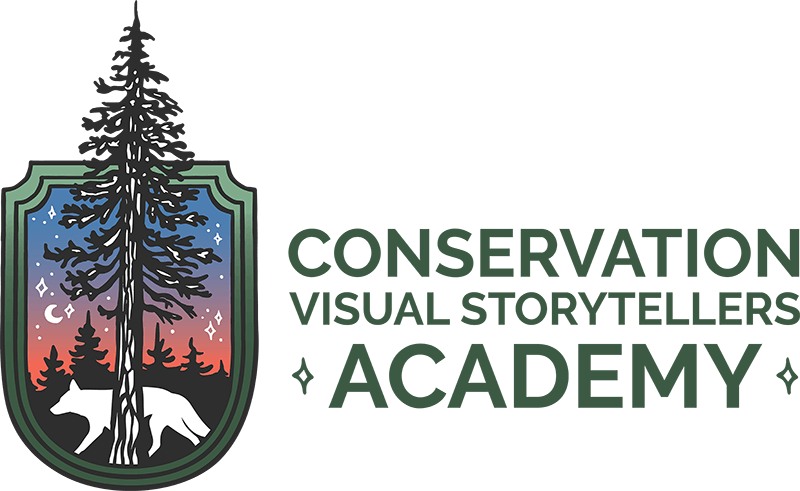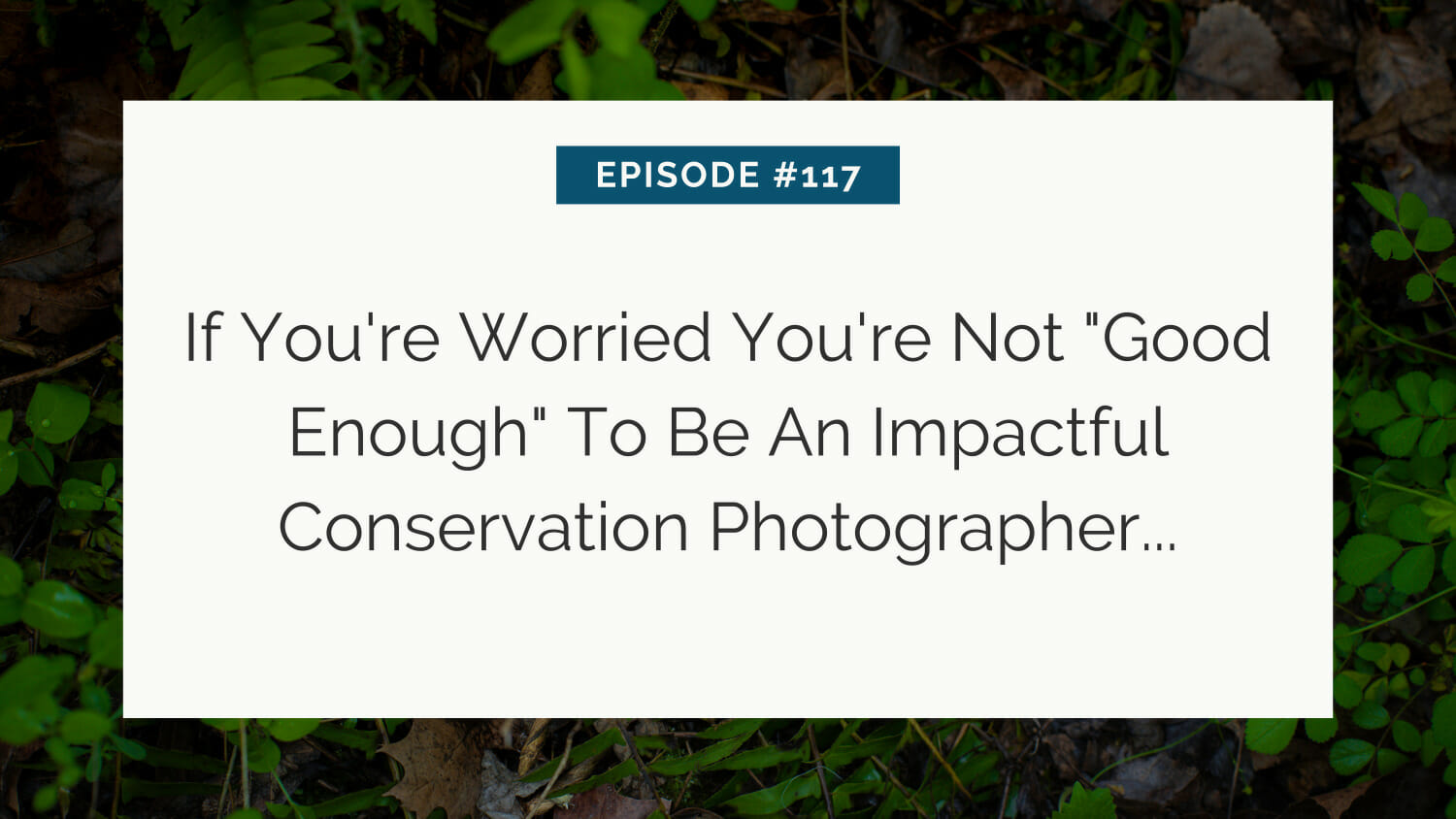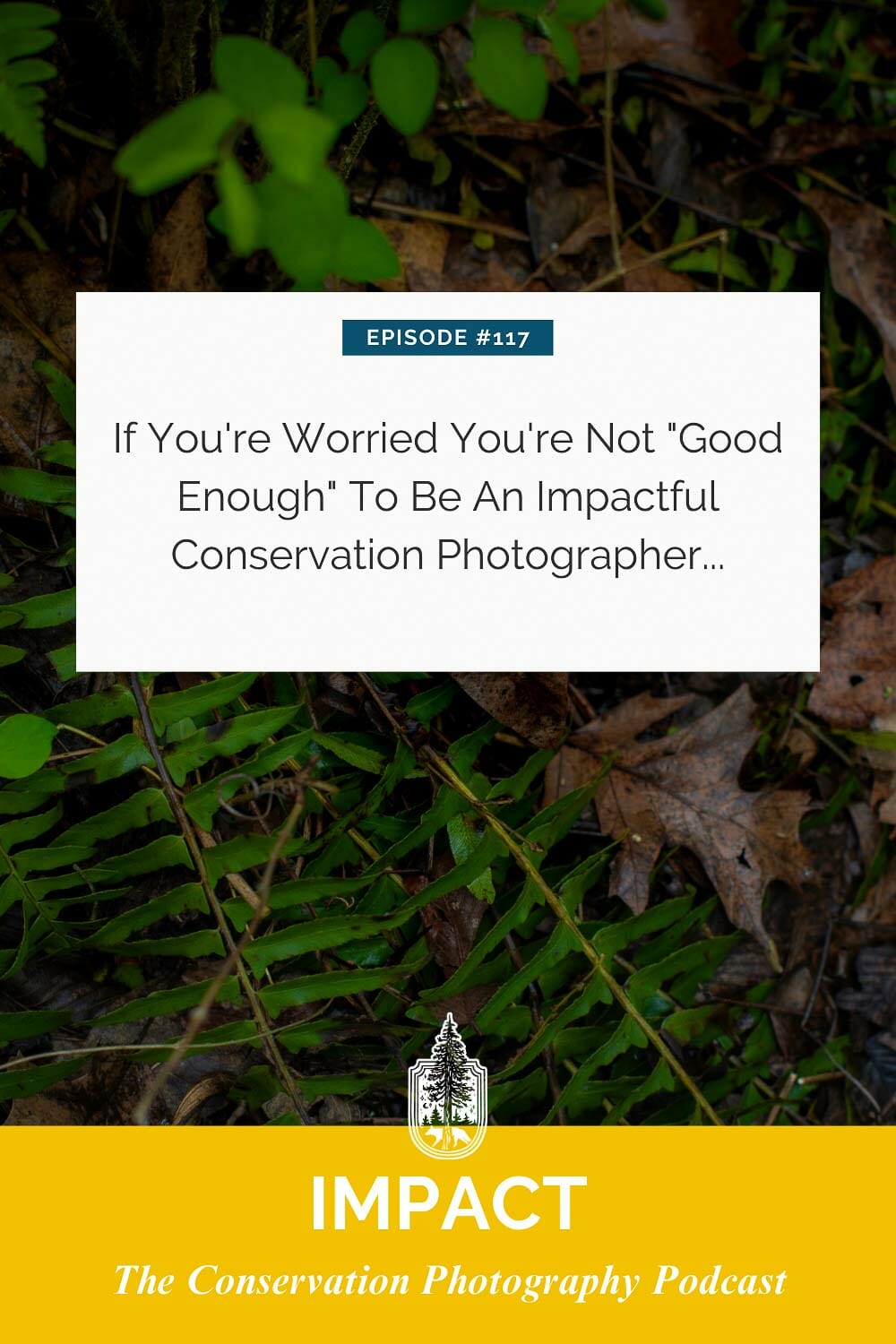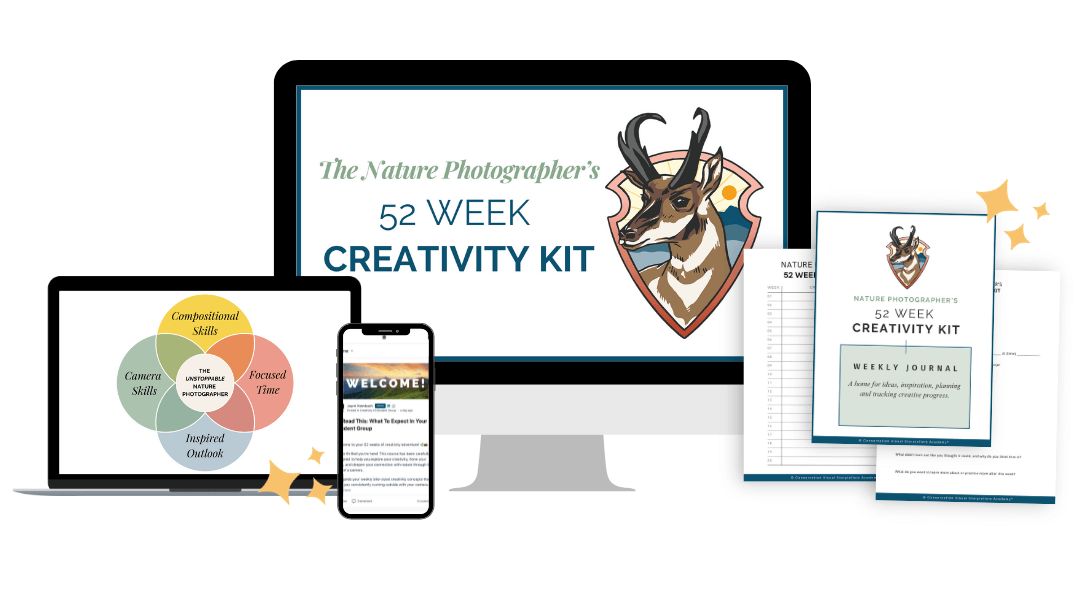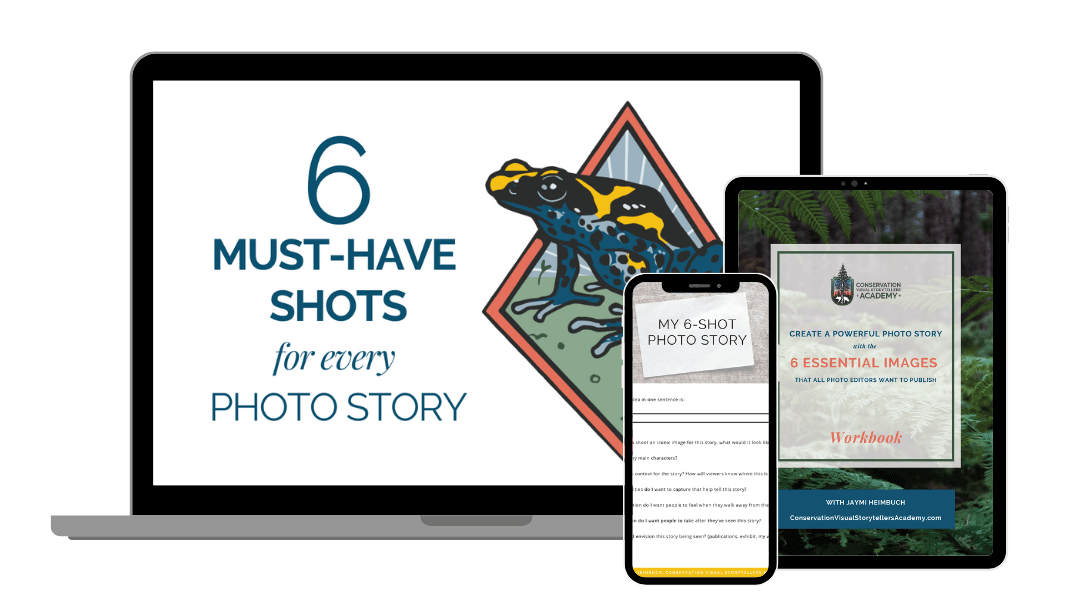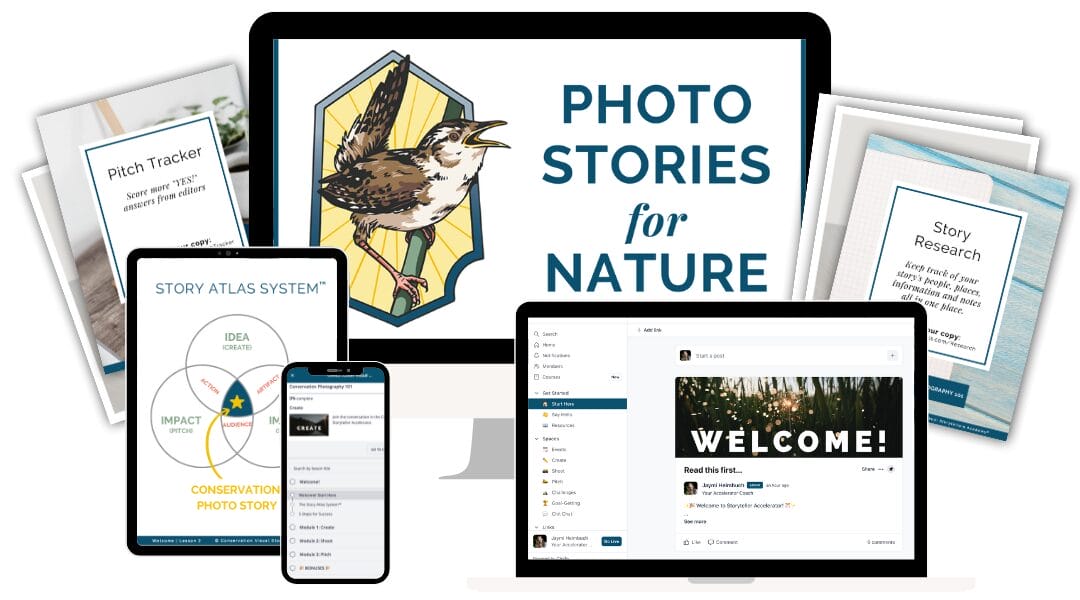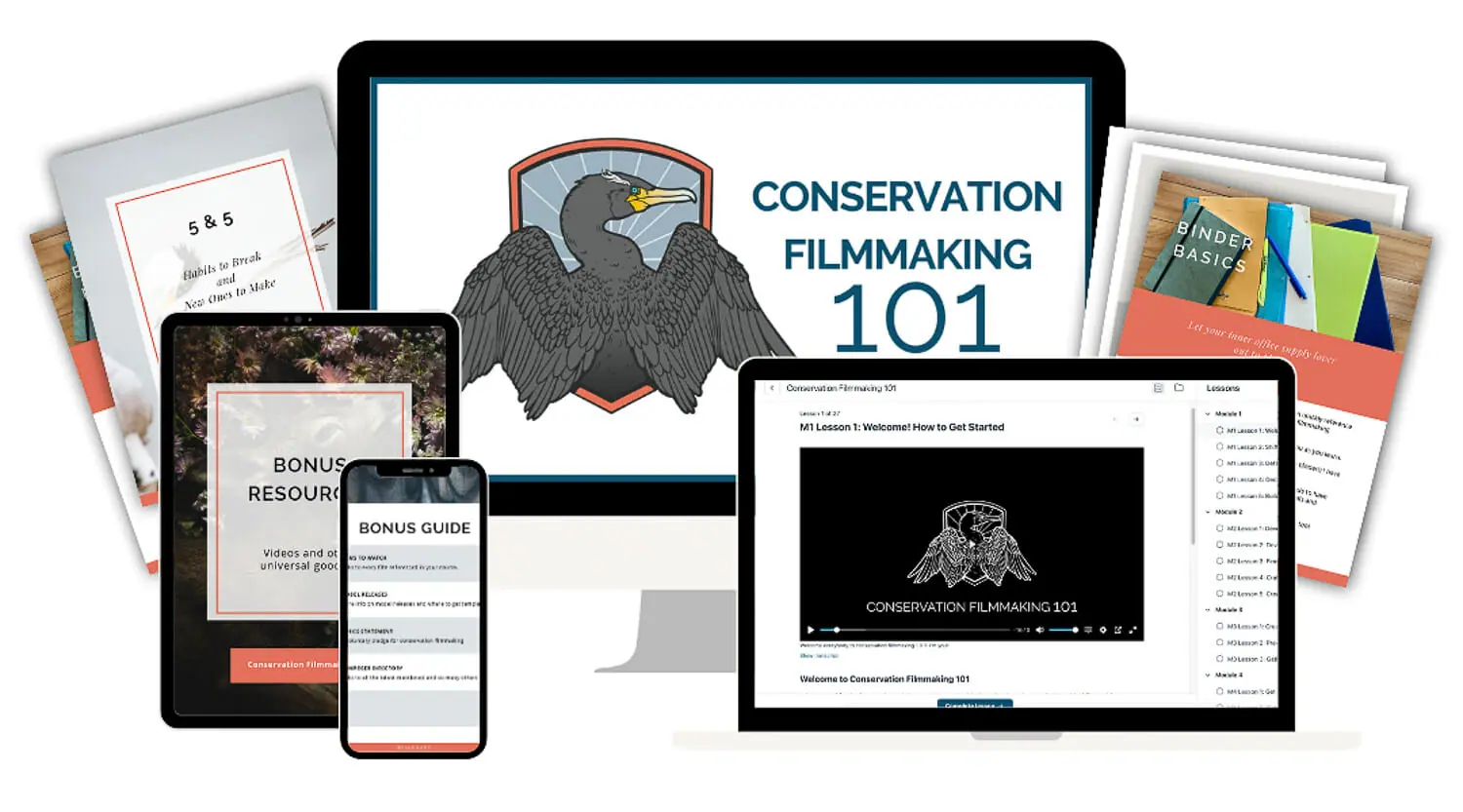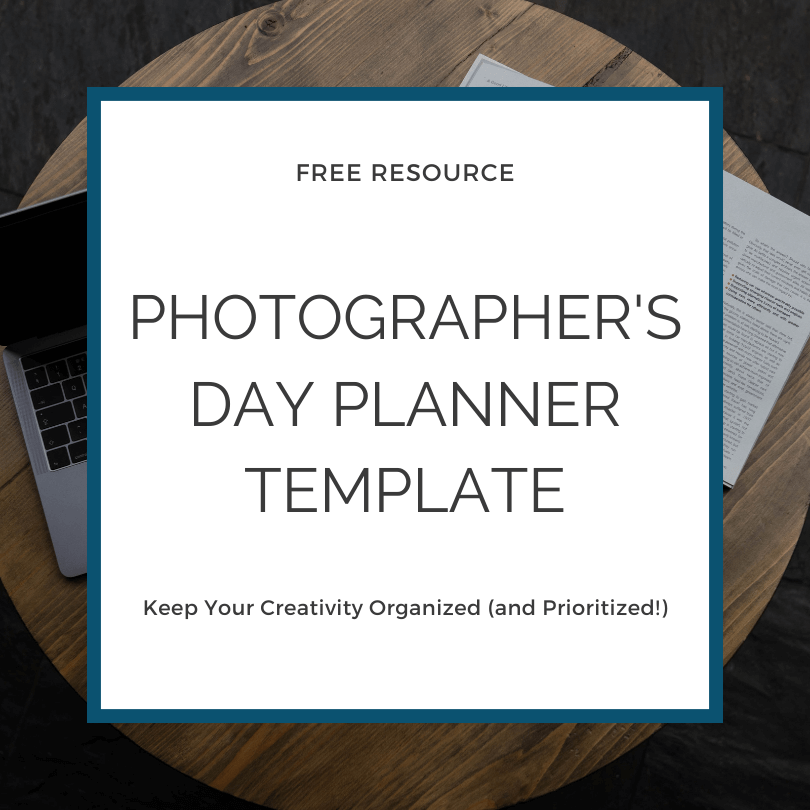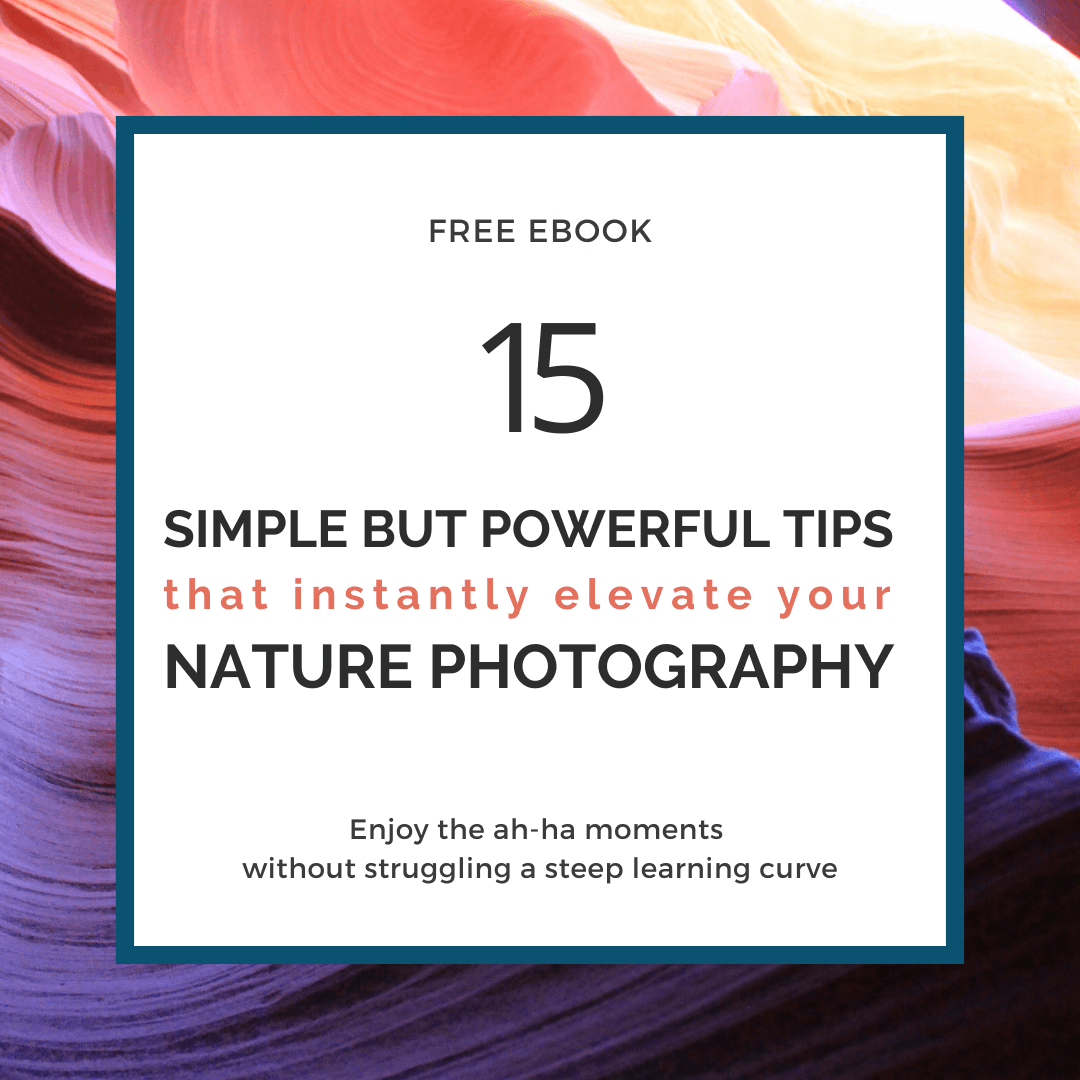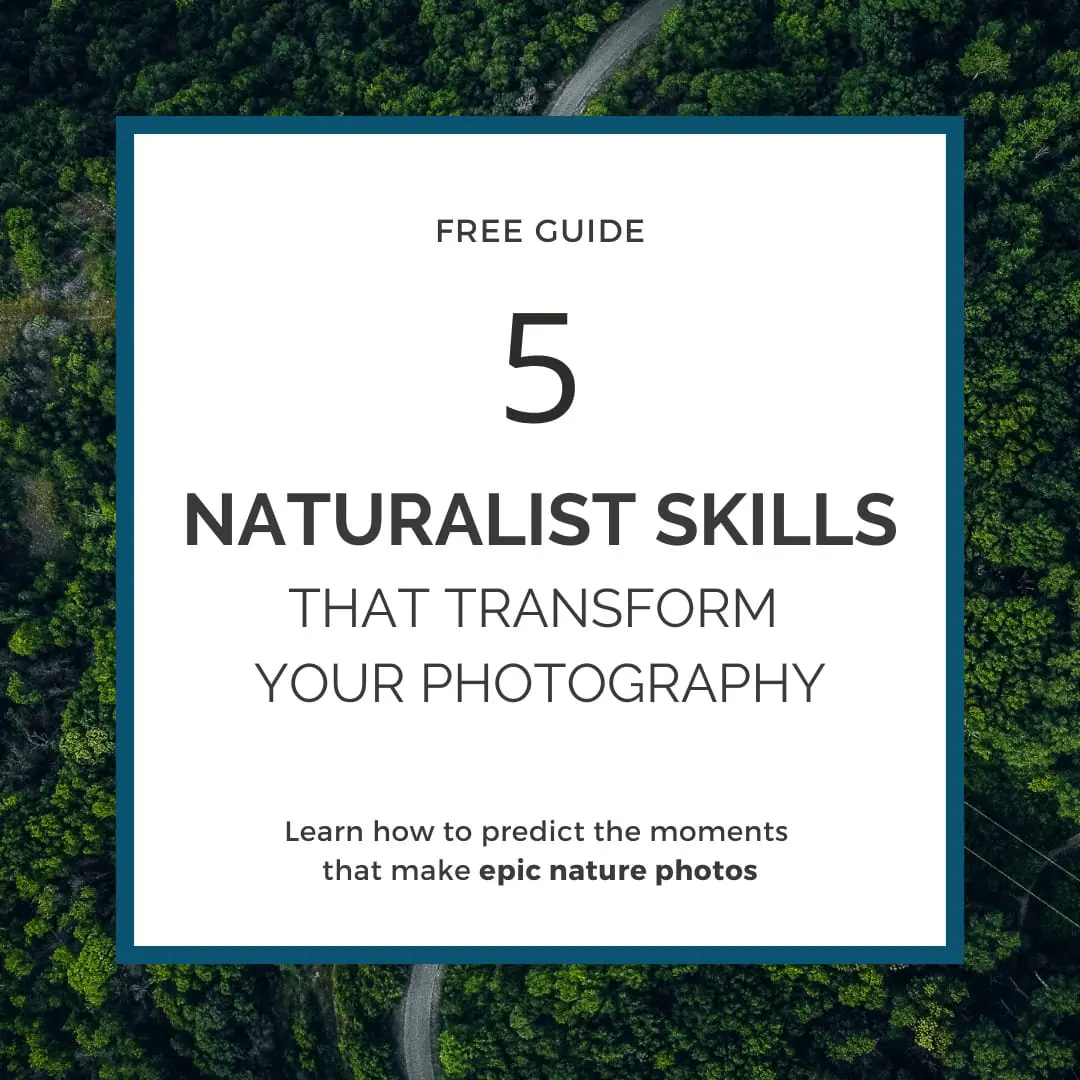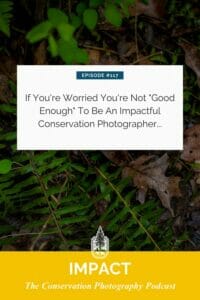If You're Worried You're Not “Good Enough” To Be An Impactful Conservation Photographer…
Imposter syndrome. Self-doubt. Uncertainty. It's all super familiar territory to *everyone* in our field (yes, even the pros). So if you're feeling it, know you're not alone. Hit play on this episode for a comforting reality check and helpful strategies to cut through the nerves so you can focus on confident creativity.
How to put imposter syndrome in the back seat
Insecurities and worries about your abilities as a creative easily pop up…
especially as you are moving from being an enthusiastic photographer of anything that moves in front of your camera to really trying to be a more structured storyteller…
They are frequent and annoying.
“Am I really a good enough photographer to make an impact in conservation photography?”
“Where do I need to get to be taken seriously as a conservation photographer… and will I ever get there?”
“Can I really ever call myself a conservation photographer or will I be forever faking it?”
Pretty much everyone has had these thoughts at one point or another (or worse, at many frequent points…).
It's very tough state of mind because you set up your own roadblock.
And life already has enough roadblocks!
So in this episode, we dive into why these thoughts pop up and what to do about them – including strategies that are SUPER helpful for when you're in the moment, amidst the swirl of doubt, and you need a lifeline to pull you out.
Ultimately, know this:
You're a talented, creative person.
You're needed, and what you create is appreciated.
So roll up your sleeves, use one of the strategies from this episode to cut through the noise and the nerves, and let's get to work because there's important visual storytelling to do!
Episode 117: If You're Worried You're Not "Good Enough" To Be An Impactful Conservation Photographer...
Shownotes: ConservationVisuals.com/117
(Digitally transcribed, please forgive any typos)
Jaymi Heimbuch:
[00:00:00] Jaymi: Hey there, and welcome to this episode of Impact, the Conservation Photography podcast. And Joe, good to
[00:00:06] Jaymi: see
[00:00:07] Jo: Hello, Hello. Good to see you too.
[00:00:09] Jaymi: Cool. So this episode is an interesting one. We are diving into a concept that. I sometimes hear, but I've actually seen very frequently on surveys. So I often will send out surveys to, students, to audience members to kind of just get a vibe of what people are struggling with or what they're thinking about or what they're concerned with so that I know what resources I wanna create or, , what topics would be really helpful to talk about.
[00:00:39] Jaymi: And one of the things that I've seen come. Is the topic of today's episode, and so Joe and I are kind of diving into this idea because in the next episode we have a story that we're gonna talk about. That's a perfect example of what we're unpacking today.
[00:00:56] Jaymi: Does that sound good, Joe?
[00:00:57] Jo: That sounds great. Let's talk about it.
[00:00:59] Jaymi: [00:01:00] Okay, so the topic that we're digging into are some of those insecurities and worries that easily pop up, especially as you are moving from enthusiastic photographer of nature and wildlife and anything that moves in front of your camera to.
[00:01:16] Jaymi: Trying to really be a more structured storyteller to, to really move into conservation photography with a level of seriousness and the idea of those things popping into your head. Like, am I really a good enough photographer to make an impact in conservation photography, or at what point? Do I need to get to be taken seriously as a conservation photographer or to feel like valid as a conservation photographer? So, for instance one of my coaching clients told me that they felt like they need to have a certain number of publications under their belt before they'll really feel like they're considered valid.
[00:01:56] Jaymi: As a photographer. So it's almost like they're pretending [00:02:00] to be an impactful conservation photographer until they have X number of public, like whatever number they decide in their head makes them legit. And I, I've heard this come up often, especially in like I mentioned, survey responses where, and I do this sometimes too, like my email list will randomly get emails from me being like, What's your biggest struggle right now?
[00:02:19] Jaymi: And I will email you back with my best piece of advice for it. And what I hear is different variations of. Am I really good enough? How do I know if I'm good enough, technical wise, skill wise, creative wise, opportunity wise, all of this to really be able to make a difference with my photography. It's a tough state of mind to be in.
[00:02:41] Jo: It's very tough state of mind because you're, you set up your own roadblock so you, you've got enough roadblocks in life to keep you from moving forward for whatever it is that you're trying to achieve. And then somehow we manage to just. Then add our own on top of it. And why we do that to ourselves is [00:03:00] quite a mystery, I think.
[00:03:01] Jo: so, I'm glad we're talking about this because this is the case for anything. but Especially around when you're trying to do something that's creative and it's something that comes from your heart and you have. This strong connection to, and a connection to your own identity.
[00:03:14] Jo: So I can just imagine that this is a very difficult thing for a lot of people in conservation
[00:03:19] Jaymi: Yeah, I think it's a difficult thing too for every single one of us. I will happily be very transparent right now in that. I don't think that this worry ever really goes away. Imposter syndrome is a real thing I think for most people at all levels. And I feel imposter syndrome or am I really good enough to be, you know, doing what I do all the time.
[00:03:43] Jaymi: And joy. I remember telling you that I recently did a speaking engagement and literally words are coming out of my mouth. I'm. On this webinar and I think 150 people or something had showed up to this camera club event, and I, and I'm teaching, [00:04:00] words are coming outta my mouth and the whole time in my head is another track saying, Is that right?
[00:04:06] Jaymi: Are you really , is this good enough? You sound like an idiot. If another peer of yours heard you saying this, are they gonna agree with you or disagree with you? Are you just being, does the audience really, are they into this at all? Did you just go off track? All of that is going on? , who are you to really be giving this presentation and.
[00:04:23] Jaymi: And it's like every once in a while I have to really check myself and be like, No, I know my stuff. I'm only talking about things that I have experience in or that I have a skill set in. But at the same time I'm still like, Oh, there's someone else who should have gotten this gig cuz they know more than me
[00:04:40] Jo: needed your aunt there to say, Well, that's stupid.
[00:04:43] Jaymi: I know . What was, Okay, so that folks is an inside joke with me and Joe. What were we, I think I was leading a safari and you were a guest on the
[00:04:53] Jo: I was a guest on the Safari and we were jet lagged in London and you were, had real low [00:05:00] energy and you're like, Okay, oh boy, this is going to, I don't know, maybe I can't do this. You know, I just don't know if I'm up for this yet. And I'm sitting in the airport and I'm tired and I'm Trying to figure out what the next step is, and I just don't wanna get hit by one of those red double decker buses.
[00:05:17] Jo: And, and I just turned to you and I just said, Well, that's stupid. You know, you can do that. And you just looked at me like, What? And
[00:05:28] Jaymi: Yeah.
[00:05:29] Jo: I realized, oh, I guess I'm tired too. Um, . But, but it was supposed to be a compliment.
[00:05:38] Jaymi: Yeah, you are ready for this, Jamie. Just go for it. Yeah, I had been, cuz I had been studying the wildlife and re I had five natural history books and, and there was still this fear of , well it's my first time in Africa too to this, you know, area and am I gonna be able to do a really good job leading these clients?
[00:05:57] Jaymi: So anyway, I think that we [00:06:00] all, no matter. What, As soon as we get into a position that maybe pushes us a little bit outside of our comfort zone or has us stretch ourselves a little bit in some way, this comes up. And so one of the things that I wanted to talk about with you, Joe, are ways to flip the script, cuz that's what I think pulls me out of it.
[00:06:19] Jaymi: I know when I'm feeling imposter syndrome is how do I flip the script on this and create more productive thoughts or questions to be asking myself. But before we dive into that, I'm curious, you know, just to talk about in a non photography world, where in your life have you maybe experienced some of this?
[00:06:37] Jaymi: Like in, in
[00:06:38] Jo: You know, besides like every day. Yeah. yeah, it's, I think that I, I dream of being one of those people who don't have doubts in themselves. You know, there are few people out there like that, and it's just marvelous to watch them because they go through life in, in a way that they're just ready to.
[00:06:58] Jo: Fall flat on their face and [00:07:00] it's gonna be fine. And, and they're just gonna get up and go again. And, and it's kind of like, , that 18 month old toddler, you know, they just sort of, they figured out how to walk and they just go for it. And they don't know , that they're gonna hit some curb that they can't step over or, that they're gonna fall down and bang their knee.
[00:07:18] Jo: They're just gonna go right ahead for it. And, and I just would love to be one of. People. so you're right. I think everybody's got a little bit of that, but I know that, you know, there are a couple of pieces of advice that I got from your NN and papa, my parents one was make sure and marry your best friend.
[00:07:37] Jo: So that was a good, that was a good piece of advice. But the other was just ask cuz all they can say is no.
[00:07:44] Jaymi: Mm-hmm.
[00:07:45] Jo: You're not going to get, , strung up on the yard arm, nothing horrible is going to happen to you. So if you're not feeling like you're understanding what's happening or you're not feeling like you're ready, or you think you need [00:08:00] some help to be more prepared, just ask.
[00:08:03] Jo: Cuz more than likely people really wanna come to your rescue. They really wanna help. I think that's something that's always stuck with me and made me realize then that it's okay to be not quite ready and not quite there. , Some other advice I got by one boss that I really admired he said, When somebody tells you you're doing something wrong, they're not telling you that you, the human being is wrong.
[00:08:30] Jo: They're just telling you that the act that you're doing isn't going to meet the need of what needs to happen right then. And so when everybody says, don't take it personally, it's like, well, how can you say that? Of course I'm gonna take it personally, but there is this weird Way of detaching yourself from the thing that's happening and you as a human being.
[00:08:51] Jo: And I think that's something too, that if you can, if you can take that little step, that's a big step to letting you say, Yeah, it's all right for me to move [00:09:00] forward because. It's not about me. I'm still a good person. I'm still, people wanna hang out with me. I still am loved by my, you know, significant other or whatever it is.
[00:09:12] Jo: But yeah, I, I just stepped in this pile of. Elephant poo and, you know, , there it is. I can't, and I'm gonna have to get myself out of it. And so , that's not a reflection on me personally and, and all of those kinds of things. So that, so, so my tell that to myself. But I would also tell that to people that worked for me, they're like, Oh, I just, this is too overwhelming.
[00:09:35] Jo: I just don't think I can do it. I don't think I have the skills. It. You know, I wouldn't be asking you to do this if I didn't think you could do it.
[00:09:43] Jaymi: mm-hmm.
[00:09:44] Jo: Somebody else outside of yourself is already thinking that you can do this thing. If that's the case, then more than likely you can, and they'll be catch you.
[00:09:54] Jo: If you start to fall, it's okay.
[00:09:56] Jaymi: Yeah. I love that. I think that the [00:10:00] idea of separating who you are as human from role that you are playing is kind of getting at the. Ability to be both insecure and brave at the same time. Cuz you can feel insecure, you can feel like you're doubting yourself, and then you can be brave at the same time and think, Okay, well what can I do to make myself be ready?
[00:10:25] Jaymi: Or what can I do to take three steps forward even though this is scary? Or what can I do? Like you start to actually. A more productive mindset around these fears of, Am I really good enough? Cuz ultimately we get these thoughts in our head. Am I good enough? Is this okay? I remember driving to this was in 2017.
[00:10:48] Jaymi: It was April of 2017 and Nick was driving me to a photo shoot. It was for a story that I had pitched and got accepted, but I hadn't shot it yet, so I was going to go shoot it, and it had [00:11:00] been a while since I had really picked up a camera in any serious way and we're driving up.
[00:11:06] Jaymi: I remember exactly what, what it looked like, and I just started. Bawling and I was like, I haven't photographed in a long time. I am gonna blow this. I, this is gonna be so terrible that I, I'm just, I can't even believe that I'm attempting to do this right now when I haven't been practicing on a regular basis for a while and.
[00:11:25] Jaymi: He was, he, he was very kind, but at the same time just kind of gave me a, Well suck it up cuz we're going, like, we're, we're driving there. We're not changing plans or turning around. So you better figure it out, but in a loving, kind way. But I, I mean even then I feel like I had been externally validated by a publication saying, Yeah, we want that story.
[00:11:45] Jaymi: That sounds great. Go get it for us. Yet at the same time, I'm completely talking myself out of it. And I think that in those moments, if you can say, Well, I, Jamie Am feeling really insecure, but I'm also smart enough to figure it out and I'm brave enough [00:12:00] to to give it a shot and I'll figure it out.
[00:12:02] Jaymi: I'm usually pretty resourceful, so I'm gonna put those skills into this. Like you can call yourself back and then turn it into something that's more productive. Okay. I feel really insecure about this right now. What can I do to set myself up between now and six hours from now when we arrive? What can I do to kind of get myself, can I pull my camera out and play with the buttons and take some shots of us driving that?
[00:12:23] Jaymi: Just kind of get me in the zone. Is there anything that I wanna maybe look up? Can I call someone can I call Mel and have her just talk me off the edge and, and remind me? Or can I call Joe and have her tell me, Well that's stupid.
[00:12:38] Jaymi: And you know, like, what can I do right now to turn this moment of insecurity into something where it's still productive and I'm still moving forward and I can move forward in the bravest way possible, even while I'm scared?
[00:12:48] Jaymi: And, you know, ultimately that shoot turned out.
[00:12:51] Jo: Yeah. Yeah. And really, I've heard you say before too, you ask yourself what's the worst that can happen? Or what, what [00:13:00] would failure look like? Oh, well, I lost my camera. Okay. What would I do? Well, I would probably go to the closest camera store and see if I could rent something. Okay. you give yourself another scenario.
[00:13:12] Jo: What's the worst thing that could happen? I don't get the shots that I needed. Okay. Well then maybe you'd talk to the editor and see if you could, delay publication because you wanna take another trip to go do this or something. And so I liked that idea of you, not necessarily in a dooms day way, but in asking yourself, Well, what could make this not good?
[00:13:33] Jo: What would make this challenging or scary? And then you give yourself that scenario and you realize, Oh, You could figure out every solution, there's an answer to it all. There's, there's always something there that will get you out of it. And then once you had those ideas in your head, now of a sudden everything wasn't so scary because everything was a little more known to you.
[00:13:57] Jo: It wasn't this, this dark shadow [00:14:00] looming that you're driving into this tunnel with no end in sight. You know? It was more like, Oh, okay, I do this. I.
[00:14:07] Jaymi: And a lot of times when you do get yourself into that, Okay, well what's the worst that could happen in that, Well, this happens. Once you start to get far enough into that questioning series, you figure out lives aren't at stake.
[00:14:19] Jaymi: or, you know, generally they're not at stake. Um, You are kind of hyping up these big catastrophic potential outcomes when really in the scope of being alive in the world, not that big of a deal, and often really great things end up coming out of it when you move forward.
[00:14:40] Jo: yeah, yeah. I used to tell people cuz we worked at a university so the stress level around registration time or around graduation time or different types of the academic cycle. People could be freaking out, you know, Oh my gosh, this is the day that we have to tell 30,000 students.
[00:14:59] Jo: They're not being [00:15:00] accepted, and if this goes wrong, then , all hell breaks loose. And then I would just look at 'em and say, Yeah, but we're not. Launching a space shuttle or doing brain surgery. the lives are not at stake here. We're lucky enough to be in a situation where no one, in theory, is going to die, because if something went wrong with what we do for a living, and so.
[00:15:25] Jo: What's the worst that can happen? Let's talk about that. Okay. And then we'll get through that. and so that whole taking it to that next level of saying, Well, what's the worst that can happen? I can handle it. I can handle it. I can handle
[00:15:39] Jaymi: And we can apply that type of more productive questions or productive ways of thinking. Like, Okay, I feel this way. Well what can I be a little bit, Or, What's the worst that can happen? What can I do to be a little bit more prepared? We can apply that back to the idea of. At what point have I produced enough great stuff, [00:16:00] had enough stories published, had enough images sold, or whatever it is that I'm considered valid or that I've arrived, or ultimately that concept is wrapped up in the idea that.
[00:16:12] Jaymi: Other people outside of you are judging you for what you have or have not created yet, which then you, you're deciding that other people are judging you on this bar, so you are ultimately limiting your own opportunities or opportunities that you're willing to go for because you've decided that other people think that you have to get to a certain level to be considered, valid to do something.
[00:16:37] Jaymi: So, so that means that you're not pitching yourself to go speak or you're not. Pitching a story or you're not positioning yourself as an expert on the topic that you probably really are very much an expert at and could speak very well at an event at, And you're saying, Oh, but they're not gonna take me seriously as an expert because I don't have 15 stories published.
[00:16:59] Jaymi: I have [00:17:00] 12. No one is looking at, Oh, well you're not really a conservation photographer because you haven't helped put a species on the endangered species list, and until you do that, then you're not good enough. No one's thinking that, and you are limiting the impact that you could be making on so many levels by thinking, Oh, well I can't try for this opportunity until I've met a certain.
[00:17:27] Jo: Yeah, that I listening. Do you say that? And, and when I hear people. Talk like that. I have a, I have a hard time relating to that because I have my own insecurities, but I don't have one that way per se, in terms of being good enough to try something. I know that I might not necessarily succeed, but I always feel like I.
[00:17:52] Jo: The right and the ability to try. And I think when people are saying that about themselves, they're using that as a [00:18:00] mechanism to protect themselves from failure. And because that failure is so scary, they don't wanna say that they're stopping themselves, so they're gonna decide it somebody else that's stopping them.
[00:18:14] Jo: That's a really challenging thing I would imagine, , to get over and that, I would love to be able to see some literature on how do people respond to that. For instance, as the support system, when somebody is saying that, because it's one thing to say, Well, that's stupid.
[00:18:29] Jo: You know, that's not true. But it's another to help somebody get past that barrier that they're putting up for themselves. The approach that I took when people were like that with me was that I would just give them smaller steps to achieve something.
[00:18:45] Jo: So if I asked them to work on a project and they felt overwhelmed by that and they didn't think they were qualified to do that, I would say, Okay, well let's not look at the big picture. Let's just look at the next first step. Could you [00:19:00] do this? Yeah, I could do that. Okay, well let's do that and then, then we'll come back and we'll, we'll revisit whether or not you can continue.
[00:19:06] Jo: And so it slowed me down in the sense that I had to, to slow myself and my expectations down to meet their level of security to move forward and had to think in a little more detail to coach them through something, but. Gave them confidence along the way. Each step. Each step. And then until pretty soon, they were so far into it, they didn't know they were scared anymore.
[00:19:29] Jaymi:
[00:19:29] Jaymi: Well, one strategy that I think could be really helpful for. Us as conservation photographers. And the reason why I put the emphasis on the word conservation is because we do what we do, in part because we love photography and the art of it, but also because we have these big goals with what we want that to do.
[00:19:48] Jaymi: Like we want our work to have meaning and to help species or help habitats or to make a difference, to move the needle, to have people care more about nature. Like we [00:20:00] have these goals with that. And so I think one thing. photographer can do when they're feeling in that kind of cycle of thought like they're holding themselves back, is ask the question other than myself, who loses out if I don't go for this?
[00:20:20] Jo: That's a great way of thinking.
[00:20:22] Jaymi: Cuz it's not about me. Remember, it's not always about me. It's not only about my photography or my, or what people think of me. I'm a vehicle for other things happening. Other species getting protections, other habitats being protected, other people learning like instilling a sense of awe in other people that they might not get if I don't do this.
[00:20:43] Jaymi: And there was a really great example, the story's not mine, so I won't. Give specifics, but I heard a story about a photographer who was really raising his hand for any opportunity he could get to talk about his project. And so the person who told me the story asked [00:21:00] him, , What makes you so brave to always be like pushing yourself forward?
[00:21:03] Jaymi: Cuz some people could look at that and think, Wow, you're really pushy. And he's like, If I don't do this, the species that I'm photograph. Loses out. I speak for that species. So if I don't put myself forward, that species doesn't get in front of other people and audiences and potentially get protection. So it's my job to speak on behalf of that.
[00:21:24] Jaymi: So I will raise my hand every time
[00:21:26] Jaymi: and I thought,
[00:21:28] Jo: way of thinking about that is you're in a role of advocate. Yeah. That's so cool. I love
[00:21:33] Jaymi: it takes the pressure off of you, like, yeah, your photography and your skills with the camera editing and your skills at networking to get opportunities, Like all of that comes into it, but ultimately, it takes the pressure off of you and puts it on the amazing thing that you're trying to accomplish, and that can make it a lot easier to say, Okay, well, what's the worst that could happen?
[00:21:57] Jo: Right. It just wouldn't get done. I mean, [00:22:00] and so you're already ahead of the game by the fact that you're gonna.
[00:22:03] Jaymi: Mm-hmm. . Absolutely. And
[00:22:06] Jo: way of thinking of it.
[00:22:07] Jaymi: I think so too I think it's just such a great mindset to have. So but I will say that in the next episode we're gonna talk about a specific story from one of my students .
[00:22:19] Jaymi: who Really leaned on that idea of what's the worst that can happen and ended up going from a situation that could have just been one that a lot of people would just put their hands up and be like, Nevermind. And instead the student walked away with a really incredible opportunity and it was a hundred percent based on mindset and what's the worst that can happen and what's the next best step that I can take to get through this?
[00:22:45] Jo: Good for them. That sounds great. Oh, well. Excited to hear that story.
[00:22:49] Jaymi: Yay. Well we'll talk about it in the next episode, so stay tuned for that. And meanwhile, any lost words of wisdom, Joe, before we wrap up?
[00:22:59] Jo: No.[00:23:00]
[00:23:00] Jaymi: Okay. on that note, we'll talk to you next week.
